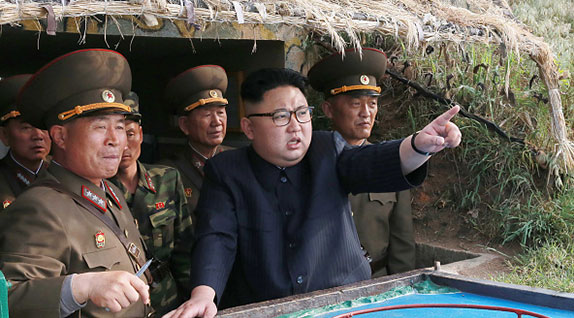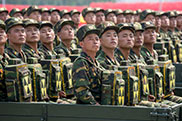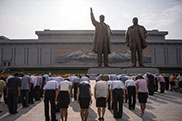 STR/AFP/Getty Images
STR/AFP/Getty Images
Readying for war: North Korean leader Kim Jong Un inspects defense detachments on Jangjae Islet and Mu Islet (released May 5, 2017).
Why has North Korea remained a thorn in the world’s side for decades?
Subscribe to the Real Truth for FREE news and analysis.
Subscribe NowThe Hermit Kingdom. About the size of Cuba, its population of 25 million is mostly impoverished and starving, with a large percentage imprisoned. Its GDP is an estimated $40 billion. For comparison, the African nation Cote d’Ivoire (which has a similar population) has a GDP of $87 billion. North Korea has one main ally in China, and even that is on shaky footing. Few nations trade with it. And its leader is almost universally reviled.
How can such a tiny republic, with so few things going for it, cause such global consternation? Even more, how has it gone on for so many decades?
Think of the recent geopolitical waves the communist country has made.
Reuters: “North Korea’s missile program is progressing faster than expected, South Korea’s defense minister said.”
“The North has been working on a missile, mounted with a nuclear warhead, capable of striking the U.S. mainland.”
USA Today: “North Korea’s missile test…highlights the country’s frantic efforts to accelerate its nuclear weapons program while political uncertainty has gripped the United States and South Korea, analysts said.
“‘They see an opportunity to race ahead and get as much nuclear weapons capability in place as possible,’ David Albright, president of the Institute for Science and International Security, said…”
The New York Times: “The North has recently test-fired a series of missiles based on a technology that would give the United States little warning of an attack. The new generation of missiles uses solid fuels, enabling them to be rolled out from mountain hideaways and launched in minutes.”
Add to this that North Korea just abducted another American citizen, and a propaganda video shown to a large crowd in Pyongyang during birthday celebrations for Kim Il Sung, the late founder of North Korea, depicted a missile destroying an American city.
 Ed Jones/AFP/Getty Images
Ed Jones/AFP/Getty ImagesMissile and nuclear tests “show that North Korea really is practicing a so-called saturation attack that would seek to fire ballistic missiles with such volume that they defeat missile defenses and slaughter US and allied forces in Japan and South Korea,” Business Insider reported.
Such provocations infuriate the American public and are met with fierce rhetoric from the White House. Even China, the closest supporter of Pyongyang, enacted a ban on all exports to North Korea that could be used to develop nuclear weapons.
Similar threats have been coming out of North Korea for decades. In just the past 25 years, the tiny Asian country has conducted long-range rocket tests, activated and reactivated nuclear facilities, harassed South Korea with artillery, and sunk one of its southern neighbor’s warships.
Despite mounting death threats and displays of aggression, the world is at a loss with how to address what many consider to be the world’s most isolated nation.
What other government on Earth would be allowed to test nuclear missiles and threaten for a decade to use them on the most powerful military on Earth, and get off scot-free?
In theory, deciding to take out the current regime over North Korea should be simple. It would mean freeing a downtrodden people. It would allow the world to help a nation with a paltry $819 GDP per capita—among the lowest on Earth. Also, it would stop a series of horrific deaths and abuses. All that would be required would be to remove Kim Jong Un from power, perhaps with a coordinated military invasion.
Of course, the reality is not so simple.
After the Korean War, the United Nations avoided North Korea as it did not want to risk provoking the Soviet Union and China. Many feared such actions would trigger nuclear war.
Even in the 21st century—with the Cold War over and communist China’s relations with the West considerably improved—dealing with North Korea is fraught with problems.
One potential strategy is a “pre-emptive U.S. strike on route to forcible regime change,” The Diplomat reported. “The risks are manifold, from war with China to chemical or biological weapons strikes on the United States or her allies to the very real possibility that Kim—aware that his conventional warfare prospects would be nil in the face of a coming American onslaught—would decide to go out with a (nuclear) bang. The most obvious rationale for Kim’s pursuit of the bomb is ‘to ensure that anyone considering imposing regime change won’t take the risk,’ reasons Harry J. Kazianis at The Week. ‘If Washington ever decided it was time to take the regime down, what reason would Pyongyang have from holding back? None.’”
 Ed Jones/AFP/Getty Images
Ed Jones/AFP/Getty ImagesSuch a strike could mean mass death. Sim Tack, a senior analyst with think tank Stratfor, told Business Insider that soldiers and civilians from South Korea, Japan and the United States were likely to die in even the smoothest, most well-planned operation. North Korea’s use of nuclear, chemical and biological weapons would amplify the devastation.
A full-scale attack could “pull the US into a longterm conflict in East Asia,” Mr. Tack stated. A surgical strike aimed at wiping out the Kim regime or Pyongyang’s nuclear capabilities would therefore be ideal.
Yet there are even problems with small operations, which could subject the U.S. to international shaming and stress relations among its Asian allies.
Even if a preemptive attack from the West were effective, “North Korea has a lot of options,” Mr. Tack said. “They have their massive, massive conventional artillery options that can start firing at South Korea in a split second.”
Removal of Kim Jong Un himself would destabilize the government’s death grip, but it would not automatically change everything. Mr. Tack continued, “Technically North Korea is under the rule of their ‘forever leader’ Kim Il Sung.”
In other words, Kim Jong Un’s grandfather is still in charge—even though he has been dead 23 years. If the current Kim were removed, another would likely take his place.
Truly ridding North Korea of the Kim regime would require removing it from the hearts of every die-hard supporter of the state.
Also, given North Koreans’ deep-rooted dislike of the United States after decades of indoctrination and propaganda, an invading military force would not likely be welcomed as liberators.
The prospect of uniting the Koreas is grim. South Koreans have little interest in integrating with the north, and those in the north have been deprived of decades of cultural development. As a result, North and South Koreans have become very different peoples with separate interests in music, entertainment and literature.
North Korean fugitive Hyeonseo Lee noticed this while living in South Korea after her escape. She said during a TED Talk: “We are all Korean, but inside we have become very different due to 67 years of division. I even went through identity crisis. Am I South Korean or North Korean? Where am I from? Who am I? Suddenly there was no country I could proudly call my own.”
How to stage an invasion of North Korea with minimal casualties and ensure it would be seen as a campaign to secure freedom—as opposed to an imperialist power-grab—remains a conundrum.
The United States has generally avoided direct intervention with North Korea. This policy of “strategic patience” has been in place since it was predicted that the Kim regime would face a demise all its own.
During the early 1990s, communist states across the globe were dropping like flies. Both China and Russia opened up diplomatic relations with South Korea and ended subsidies to North Korea’s economy.
 Ed Jones/AFP/Getty Images
Ed Jones/AFP/Getty ImagesPolitical corruption and mismanagement within the nation allowed a famine to take the lives of more than one million impoverished North Koreans. Because of this, disillusionment toward the regime spread among citizens, evidenced by increased number of escapees at the time.
During this period, Leif Rosenberger, the current chief economist at U.S. Central Command, wrote: “While North Korean military action can never be ruled out, a more likely scenario these days is a North Korean economic and political collapse.”
The famine passed quietly and by 1997 a Foreign Policy article posited that “the North Korean system is unlikely to implode or explode in the foreseeable future.”
Yet it predicted Pyongyang’s government “could well erode over a period of five to ten years if the United States and its allies remain wedded to policies that exacerbate the economic problems facing the Kim Jong Il regime.”
Again, time passed. The status quo remained.
Others even suspected that open provocations such as the attack on a South Korean warship in March 2010 and the many nuclear tests since 2009 were attempts to gain support among a splintering military.
But neither a war or secession ever occurred.
Hopes for change were high when protesters gathered in Pyongyang over currency reforms in 2009. It was believed this would result in an increased flow of information from the outside, democratic world.
Instead, the protests were short-lived and the government swiftly regained order.
There was also speculation that Kim Jong Il’s successor would not be prepared to rule. When the transfer of power occurred after Il’s sudden death in 2011, the question arose: Was Disney-obsessed, U.S. basketball fan Kim Jong Un politically experienced enough to rule with the same tight reins as his father?
Again, little has changed in subsequent years. As one of the only dictator-ruled, communist countries in existence today, it is a wonder to many that North Korea is still around.
Based on recent history, there is little hope for the tiny nation to change on its own.
“When it comes to institutions usable for social control, [North Korea] is a hyperdeveloped state,” a report by nonprofit research group International Crisis Group stated. “Kim is young and inexperienced, but the instruments of control have been established by his grandfather and father, and he has pledged to adhere to their policy line. This means reform prospects are dim. He could well be around for decades—and with a growing nuclear arsenal.”
The Atlantic noted the strange alternate reality that exists in the Hermit Kingdom: “The North Korean regime appears to have turned its greatest weaknesses—poverty, corruption, and insecurity—into pillars of stability.”
“The world has been predicting North Korea’s imminent downfall for a generation now, and why shouldn’t we? The Stalinist, totalitarian nations of the world have collapsed so consistently and in such quick succession that this one, perhaps the faintest star in the Soviet constellation, seemed sure to follow. If the Soviet Union, for all its weapons and natural resources, couldn’t keep back the tides of history, how could impoverished little North Korea? If populous, powerful China felt it had no choice but to reform and open, wouldn’t its angry neighbor have to do the same?
“Yet, impossibly, the North Korean system continues to goose step along fundamentally unchanged, its food stores barren and its gulags full, its million-man army and ethno-nationalist cult of personality defying everything that says they should have long since rotted away from within.”
As the years add up, there increasingly seem to be no good options to solve the Korea conundrum. Instead, at every turn, there are reasons inaction is the only action.
North Korea has nothing to lose: If a nation were to invade, Kim Jong Un has nothing to gain from being careful. Therefore, it would make sense to take everyone else down with him. In other words, why not send off your entire nuclear arsenal and everything you have if you were at risk of capture or defeat?
It has “the craziest kid on the block” mentality: As South Korea grows stronger due to its alliance with Japan and the U.S., North Korea grows poorer. The north is becoming more alienated from the world, thus it increasingly sees itself as “us versus everyone else.”
The desire to survive keeps citizens in line: Poverty is so rampant and the danger of being imprisoned so high, citizens see obedience to the state as the only way to get by.
State over neighbors: North Korean society has been trained to be fiercely loyal to its government to the point that citizens are willing to turn on neighbors to snuff out ideological impurity. This has prevented opposition from forming within government or society.
The Atlantic reported: “About one out of every 25 married women, for example, are recruited into the inminban ‘neighborhood units’ that are expected to openly spy on their friends and family and to sniff out enemies, whether they exist or not; failure to produce makes you suspect.”
While the world hoped the Korea conundrum would sort itself out over the last 67 years, the situation has instead become impossibly complex. Now that the Kim regime has a growing nuclear arsenal, there is little the outside world can do to retaliate.
Harvard Kennedy School summarized the main reasons change will almost certainly not come with a whimper—but with a bang:
As the days and weeks tick by—and provocations continue and Pyongyang’s nuclear arsenal grows—the rest of the world will almost certainly be forced to choose among a series of options with increasingly negative effects.